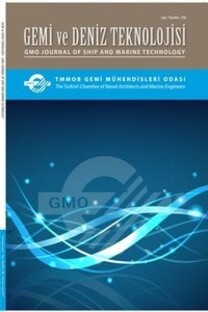Dönebilir İticinin Sert Hava Koşullarında Bir Balıkçı Gemisinin Manevra Kabiliyetine Etkisi
Bu çalışmada; bir balıkçı gemisinin baş tarafında yer alan dönebilir iticinin, gemi manevra performansına etkileri hesaplamalı olarak incelenmiştir. Tek şaftlı, pervaneli ve dümenli geminin ilk tasarımının, 40 ton yüklü durumda ve 3 knot ilerleme hızı ile orta çevre koşullarında manevra performansı yetersiz bulunmuştur. Modifiye edilmiş tasarım, geminin baş tarafında yer alan ve ilave itme kuvveti üretmek için 360 derece dönebilen bir azimut pervanesi ile donatılmıştır. Geminin manevra performansını değerlendirmek için 3 serbestlik dereceli nonlineer gemi hareket denklemleri zaman düzleminde çözülmüştür. Kullanılan matematiksel modelin manevra katsayıları iki farklı yaklaşımla tahmin edilmektedir; birincisi yarı ampirik yöntemlere, diğeri ise hesaplamalı akışkanlar dinamiğine (HAD) dayanmaktadır. Rüzgâr, akım ve dalga gibi dış bozucular, yarı ampirik yöntemlerle matematiksel olarak temsil edilmiştir. Kapsamlı bir hesaplamalı test matrisi oluşturulmuş ve bir balıkçı teknesinin baş tarafına yerleştirilmiş yeterli itme gücüne sahip bir azimut pervanesinin olumsuz çevresel koşullara rağmen geminin manevra performansını önemli ölçüde iyileştirebileceği simülasyonlarla gösterilmiştir.
Anahtar Kelimeler:
Manoeuvring performance, stern trawler, azimuth thruster
The Effect of Azimuth Thruster on the Manoeuvring Ability of a Stern Trawler in Rough Weather Conditions
The results of computational analyses on the manoeuvring performance of a stern trawler with an azimuth thruster located in the forward part of the vessel are presented. The initial design of the vessel with a single shaft, propeller and rudder is considered to have insufficient manoeuvring performance with a trawl pull load of 40 tons in moderate environmental conditions with a forward speed of 3 knots. The modified design is equipped with an azimuth thruster located in the forward part of the vessel that can rotate 360 degrees to produce additional thrust. In order to assess and simulate the manoeuvring performance of the vessel, the surge, sway and yaw equations are set and solved in the time domain. The hydrodynamic forces due to surge and sway motions and the yaw moment are represented by a nonlinear modular mathematical model. The manoeuvring coefficients of the mathematical model employed are estimated by two distinct approaches; the first one is based on semi-empirical methods and the other is based on computational fluid dynamics (CFD). The external forces due to wind, current and waves are mathematically represented by proven semi-empirical methods based on the results of scaled model tests and full-scale measurements. A comprehensive computational test matrix is established and extensive computational analyses and manoeuvring simulations were carried out to indicate that an azimuth thruster with sufficient thrust located in the forward part of a stern trawler could significantly improve the manoeuvring performance of the vessel despite adverse environmental conditions.
Keywords:
Manoeuvring performance, stern trawler, azimuth thruster,
___
- API RP 2SK, (2005) “Design and Analysis of Stationkeeping Systems for Floating Structures – Recommended Practice”, American Petroleum Institute (API), Third Edition, October 2005.
- Blendermann, W. (1994) “Parameter Identification of Wind Loads on Ships”, Journal of Wind Engineering and Industrial Aerodynamics, Vol 51, pp 339-351.
- DNVGL-ST-0111, (2018) “Assessment of Station Keeping Capability of Dynamic Positioning Vessels”, DNV-GL, 2018.
- IMCA M140, (2000) “Specification for DP Capability Plots”, The International Marine Contractors Association, June 2000.
- Inoue S., Hirano M. and Kijima K., (1981) “Hydrodynamic Derivatives on Ship Manoeuvring”, International Shipbuilding Progress, Vol. 28, No 321.
- Isherwood. R. M., (1972) “Wind Resistance of Merchant Ships”, Transactions of RINA, Vol. 115, pp 327-338.
- Kim, S.-H., Lee, C.-K. and Lee, S.-M. (2021) “Estimation of Maneuverability of Fishing Vessel Considering Hull-Form Characteristics”, J. Marine Science and Eng., 9, 569
- Nienhuis. U., (1987) “Simulations of Low Frequency Motions of Dynamically Positioned Offshore Structures”, Transactions of RINA, Vol. 129.
- OCIMF 94, (1994) “Prediction of Wind and Current Loads on VLCCs”, Oil Companies International Marine Forum (OCIMF), Second Edition.
- Remery G. F. M. and van Oortmerrsen G., (1973) “The Mean Wave, Wind and Current Forces on Offshore Structures and their Role in the Design of Mooring Systems”, Offshore Technology Conference, Paper Number OTC 1741, 1973.
- Schlichting, H., (1979) “Boundary-Layer Theory”, 7th edition McGraw-Hill.
- Yasukawa, H., & Yoshimura, Y. (2015). Introduction of MMG standard method for ship maneuvering predictions. Journal of Marine Science and Technology, 20(1), 37-52.
- Yoshimura, Y. and Ma, N. (2003) “Manoeuvring Prediction of Fishing Vessels”, MARSIM’03, Conf. Proc., pRC-29-1-10, 25-28 Aug. 2003, Kanazawa, Japan.
- ISSN: 1300-1973
- Yayın Aralığı: Yılda 2 Sayı
- Başlangıç: 1955
- Yayıncı: TMMOB Gemi Mühendisleri Odası
Sayıdaki Diğer Makaleler
Dikili Açıklarında Bir Açık Deniz Rüzgâr Çiftliğinin Kavramsal Tasarımı
Eklemeli İmalat Teknikleri ve Gemi İnşaatı Endüstrisindeki Potansiyeli
Ali ALICIOĞLU, M. Erden YILDIZDAG
Açık Kaynaklı Panel Yöntemi Kodlarının Ticari Kod ile Karşılaştırılması ve Değerlendirilmesi
Muhammed UÇAR, Emre UZUNOĞLU, Elif OĞUZ
Otonom Su Üstü Araçları için COLREG Kurallarını İçeren Çarpışma Önleyici Sistem
Bodrum Yat İnşa Sektörünün GZFT/PESTLE Analizi
Bülent İbrahim TURAN, Mehmet AKMAN, Fuat TURAN
Denizaltılarda Stirling Motor Temelli Havadan Bağımsız Tahrik Sistemlerinin (AIP) Değerlendirilmesi
Kadir Beytulllah GÜNDÜZ, Yasemin ARIKAN ÖZDEN
Dönebilir İticinin Sert Hava Koşullarında Bir Balıkçı Gemisinin Manevra Kabiliyetine Etkisi
